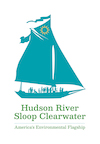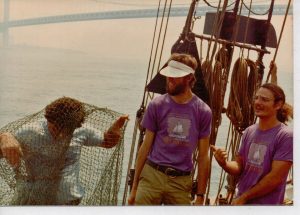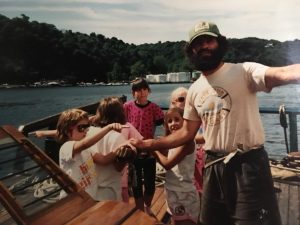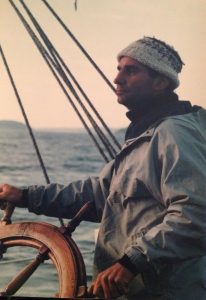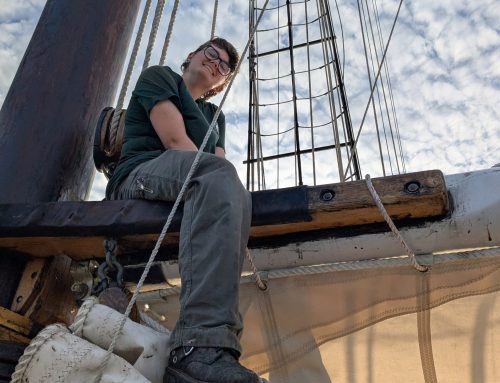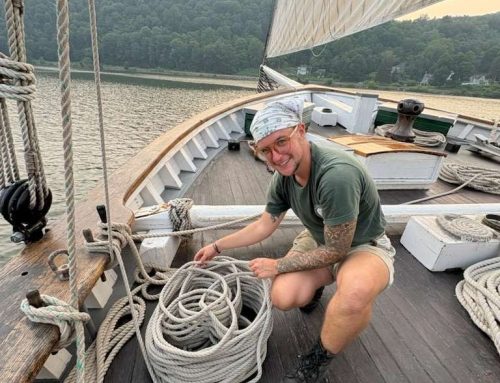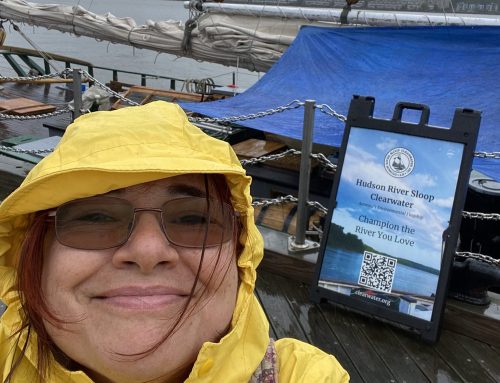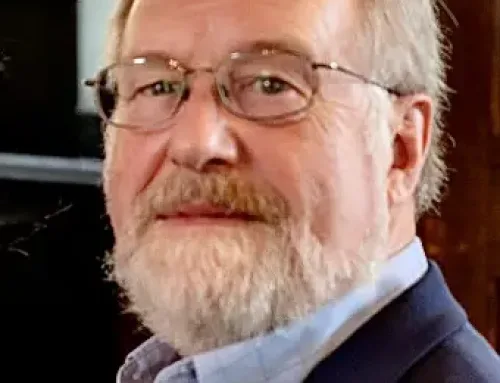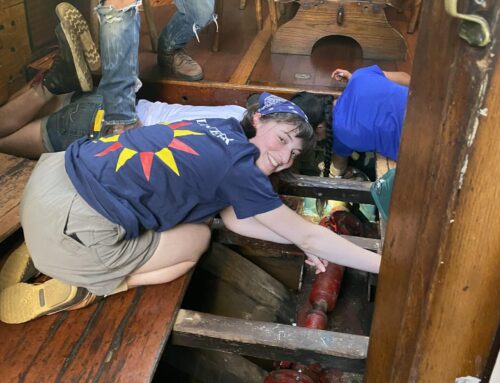Dear Clearwater,
One afternoon, aboard the Soviet American Sail, while preparations for a meal were taking place, a container of hot water slid off a table in the main dining area and landed on some of the crew that were there. Two crew, Edward Safronov and Nicolai Frantsusov, were badly burned. As I remember they both suffered second degree burns.
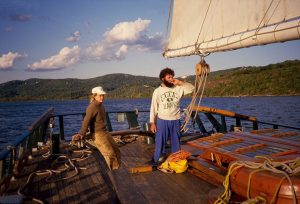 Some chaos ensued but, on the whole, cool heads prevailed, and quality care was organized quickly. Radio calls were made to those medical institutions set up to provide remote care to Vessels at sea. Al and I both had been trained as EMT’s, so he and I would sometimes talk about medical emergencies underway. It was a joy to have someone knowledgeable to discuss the subject with relative to the maritime environment that we both loved. Of course, first aid underway offshore is very different than in the middle of New York City. There are resources available to the ship’s crew that Gregg and Al were both familiar with that I had never had reason to interact with– luckily the kits had contents specifically for these kinds of injuries and the doctors recommended using them.
Some chaos ensued but, on the whole, cool heads prevailed, and quality care was organized quickly. Radio calls were made to those medical institutions set up to provide remote care to Vessels at sea. Al and I both had been trained as EMT’s, so he and I would sometimes talk about medical emergencies underway. It was a joy to have someone knowledgeable to discuss the subject with relative to the maritime environment that we both loved. Of course, first aid underway offshore is very different than in the middle of New York City. There are resources available to the ship’s crew that Gregg and Al were both familiar with that I had never had reason to interact with– luckily the kits had contents specifically for these kinds of injuries and the doctors recommended using them.
At this time, a conundrum appeared. There arose a debate on how to care for these injuries. Al and I had received the same instructions and Al was beginning to implement those instructions. That is when the Russians started to dispute the procedures. Apparently, the Russian training differed and as both of the serious victims were Russian they wanted the care to follow their training.
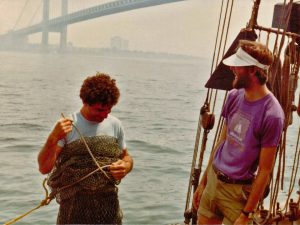 One of the victims, Edward, was a cardiologist. In years of working on an ambulance I had never been confronted with a dispute with a doctor over a method of care. I was hesitant to take such a position. I had grown up a space cadet and I had heard foe many years about the marvels of Soviet space medicine, so I was somewhat in awe that the guy in the focsle with me was a cardiologist. I was ready to follow his instructions.
One of the victims, Edward, was a cardiologist. In years of working on an ambulance I had never been confronted with a dispute with a doctor over a method of care. I was hesitant to take such a position. I had grown up a space cadet and I had heard foe many years about the marvels of Soviet space medicine, so I was somewhat in awe that the guy in the focsle with me was a cardiologist. I was ready to follow his instructions.
Not Al!
Al was absolutely confident in our training and that the care should follow our training. It came down to this. The doctor wanted to remove the burned skin which we were taught to NEVER do as it would increase the likelihood of infection. The doctor had antibiotics with him (there were none in the ships first aid supplies). His reasoning was that the antibiotics would suppress infection and/or fever.
Al stood his ground. Then a compromise was agreed upon. Edward would care for himself following the Russian training and Nicolai would be cared for using the procedures we were taught. One telling result was that Edward took much more time to recover and boasted a much larger scar. Of course, some of these differences could be attributed to differences in the original injuries.
But this story is really about Al’s leadership and faithfulness to training and procedures. He eventually went on to become a firefighter and provided medical services as part of that role. I’m sure many people received outstanding care when he was dispatched.
–
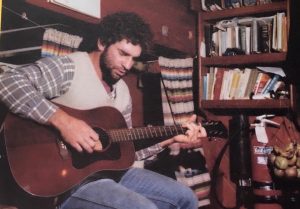 Nejmeh, Albert A., passed away on May 14, 2013, in Tacoma, Washington. One of Al’s close friends said of Al, “He’s a brother. You don’t meet people like that, maybe once in your life.” To those who knew and loved Al, he was often described as among the most interesting people they’d ever met. Indeed, one of Al’s friends posted that he was the “most interesting man in the world” a characterization that only seemed fitting to those who had the pleasure of Al’s company, companionship and unpretentious yet contagious spirit, fun loving nature and thirst for life.
Nejmeh, Albert A., passed away on May 14, 2013, in Tacoma, Washington. One of Al’s close friends said of Al, “He’s a brother. You don’t meet people like that, maybe once in your life.” To those who knew and loved Al, he was often described as among the most interesting people they’d ever met. Indeed, one of Al’s friends posted that he was the “most interesting man in the world” a characterization that only seemed fitting to those who had the pleasure of Al’s company, companionship and unpretentious yet contagious spirit, fun loving nature and thirst for life.
Former Sloop Captain, JC Parker shared with us, “Al was an amazing teacher. He had a natural ability to connect with people and I think I am among many people who thought of him as their best friend.”
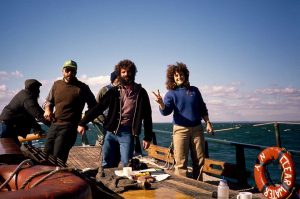 Nadine Bloch shared that, “While Al rambled and sang and sailed his way about this earth, he was loved by every living thing he met, children, elders, dogs, all! Genuine, empathetic, smart, passionate and dedicated to doing good and helping others, he lives on in our memories and actions that ripple out from his committed work and our enduring relationships. Let his memory be a blessing and a catalyst for us to keep on, keeping on ( as Pete Seeger often would say to us!)”
Nadine Bloch shared that, “While Al rambled and sang and sailed his way about this earth, he was loved by every living thing he met, children, elders, dogs, all! Genuine, empathetic, smart, passionate and dedicated to doing good and helping others, he lives on in our memories and actions that ripple out from his committed work and our enduring relationships. Let his memory be a blessing and a catalyst for us to keep on, keeping on ( as Pete Seeger often would say to us!)”
Betsy Garthwaite shared this memory in 2021 about Al, “It was 1985, and I was on the spring and summer crew that year (we used to divide the sailing crews into spring, summer and fall). The bowsprit had snapped in half while under sail, with passengers, in April of that year. Over the course of the next two days, the crew fashioned a new bowsprit out of a telephone pole. When I say, “fashioned,” I am being extremely generous. It was cut to length, made to fit the Samson post at the “heel” and made to fit the various hardware. It was not tapered, and it was not painted. We sailed around with that all season — even went to the Newport Wooden Boat Show that summer! Al Nejmeh made a new bowsprit at the sloop’s Saugerties home the following winter. He was a true craftsman.”
